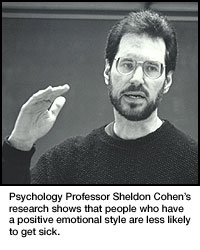|
|
||
|
|
|
A Smile a Day Keeps the Doctor Away �
"Although there is quite a bit of talk about positive emotions being good for your health, there actually is very little evidence. This is the first study that measures emotions in initially healthy people and finds that those who are generally happier are more resistant to infectious disease," said Cohen, the Robert E. Doherty Professor of Psychology. Despite Cohen's findings that positive emotions increase a person's resistance to illness, he did not find the reverse to be true, that a negative emotional style renders someone more susceptible to disease. People with a negative emotional style—those who are generally depressed, tense and/or hostile—were, however, more likely to report symptoms of illness that exceeded what one would expect from objective measures of their disease. Although those with positive emotional styles took better care of themselves and had lower levels of the stress hormone cortisol, the data did not account for why happier people were less likely to contract a cold. "The fact that happier people engage in health-promoting behaviors and have lower stress hormones suggests that a positive emotional style may decrease one's susceptibility to other diseases," Cohen said. Cohen collaborated on the study with researchers at Children's Hospital of Pittsburgh, the University of Pittsburgh School of Medicine and the Medical University of South Carolina. � � � �
�
Top�
�
�
Jonathan Potts
|
|
This Issue's Headlines || Carnegie Mellon News Home || Carnegie Mellon Home |
||
 People who are happy, relaxed or exhibit other positive emotions are less likely to catch colds than those who are unhappy or anxious, according to a study by Psychology Professor Sheldon Cohen published in the July 22 issue of Psychosomatic Medicine, the journal of the American Psychosomatic Society.
Researchers interviewed volunteers over several weeks to assess their moods and emotional styles, and then infected them with one of two types of cold viruses. The volunteers were quarantined and examined to see if they came down with a cold. People who had a positive emotional style were less likely to get sick than others. If they did get sick, they reported fewer symptoms than one would expect from objective measures of their illness.
People who are happy, relaxed or exhibit other positive emotions are less likely to catch colds than those who are unhappy or anxious, according to a study by Psychology Professor Sheldon Cohen published in the July 22 issue of Psychosomatic Medicine, the journal of the American Psychosomatic Society.
Researchers interviewed volunteers over several weeks to assess their moods and emotional styles, and then infected them with one of two types of cold viruses. The volunteers were quarantined and examined to see if they came down with a cold. People who had a positive emotional style were less likely to get sick than others. If they did get sick, they reported fewer symptoms than one would expect from objective measures of their illness.